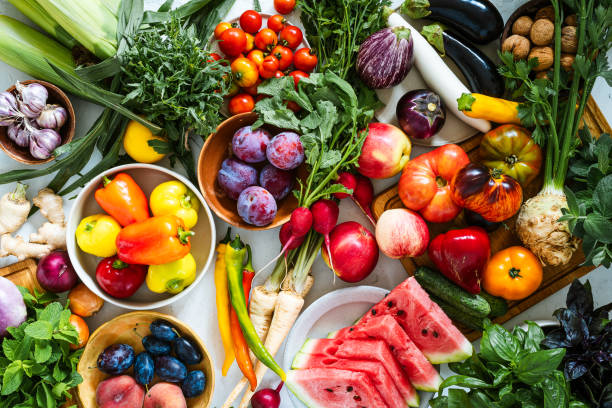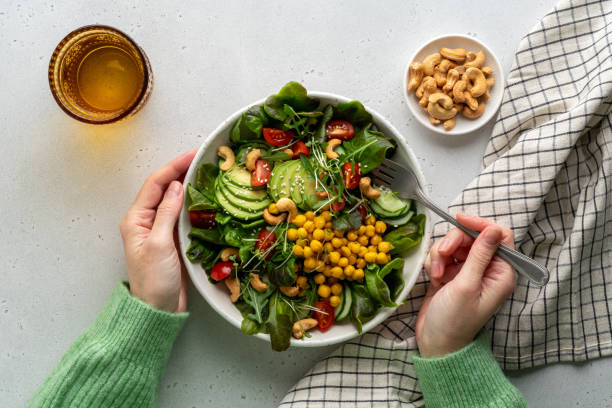What Is Plant-Based Diet ?

A plant-based diet is a dietary approach that primarily focuses on consuming foods derived from plants, such as fruits, vegetables, grains, nuts, seeds, and legumes, while minimizing or entirely avoiding animal products. This diet emphasizes whole, minimally processed foods and encourages the inclusion of a wide variety of plant-based sources of nutrients.
Key principles of a plant-based diet include: What Is Plant-Based Diet ?
Emphasis on Plants:
The majority of food intake comes from plant sources, including fruits, vegetables, whole grains, legumes, nuts, and seeds.
Minimization of Animal Products:
Animal products such as meat, poultry, fish, eggs, and dairy are either limited or eliminated altogether.
Focus on Whole Foods:
Whole, minimally processed foods are prioritized over highly processed and refined foods.
Nutrient Density:
Plant-based diets typically provide ample nutrients such as fiber, vitamins, minerals, and antioxidants, which are abundant in plant foods.
Health Benefits:
Research suggests that plant-based diets may offer numerous health benefits, including reduced risk of chronic diseases such as heart disease, diabetes, and certain cancers, as well as promoting weight management and overall well-being.

Environmental Sustainability:
Plant-based diets are often promoted for their potential to reduce environmental impact, including lower greenhouse gas emissions, reduced water usage, and less land required for food production compared to animal agriculture. What Is Plant-Based Diet ?
It’s important to note that there are variations within plant-based diets, and individuals may choose to follow this dietary pattern for various reasons, including health, environmental, ethical, or cultural considerations. Some people may include small amounts of animal products occasionally, while others may follow a strictly vegan diet, which excludes all animal-derived foods and products.
Here are 15 examples of plant-based foods:
- Broccoli: A nutritious cruciferous vegetable high in vitamins C and K, fiber, and various antioxidants.
- Quinoa: A gluten-free whole grain rich in protein, fiber, and essential nutrients such as iron, magnesium, and zinc.
- Chickpeas: Also known as garbanzo beans, chickpeas are a versatile legume high in protein, fiber, and various vitamins and minerals.
- Spinach: A leafy green vegetable packed with vitamins A, C, and K, as well as iron, calcium, and antioxidants.
- Almonds: Nutrient-dense nuts high in healthy fats, protein, fiber, vitamin E, magnesium, and other essential nutrients.
- Tofu: Made from soybeans, tofu is a versatile plant-based protein source rich in calcium, iron, and amino acids.
- Sweet Potatoes: Nutrient-rich root vegetables high in vitamins A and C, potassium, fiber, and antioxidants.
- Lentils: Legumes that are high in protein, fiber, and various vitamins and minerals, including folate, iron, and potassium.
- Avocado: A creamy fruit rich in healthy monounsaturated fats, fiber, potassium, and vitamins E, K, and B vitamins.
- Oats: Whole grains that are high in fiber, protein, and various vitamins and minerals, known for their heart-healthy properties.
- Kale: A nutrient-dense leafy green vegetable packed with vitamins A, C, and K, as well as antioxidants and fiber.
- Black Beans: Legumes that are high in protein, fiber, and various vitamins and minerals, including folate, iron, and magnesium.
- Berries: Such as strawberries, blueberries, and raspberries, are low in calories and high in vitamins, antioxidants, and fiber.
- Brown Rice: A whole grain rich in fiber, protein, and various vitamins and minerals, such as manganese, magnesium, and selenium.
- Chia Seeds: Tiny seeds that are high in fiber, protein, healthy fats, and various vitamins and minerals, including calcium and magnesium.
While plant-based diets offer numerous health benefits, there are some precautions to consider:


1 thought on “What Is Plant-Based Diet ? Here are 15 examples with benefits of plant-based foods:”